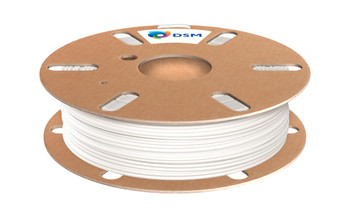Novamid
Polyamide 3D Printer Filament Novamid ID 1070 premium quality layer to layer adhesion
- Weight:
- 0.00 KGS
- Shipping:
- Calculated at Checkout
Payment options available:








Share with:
Description
Novamid® ID1070 is a unique polyamide filament originally developed as a specialty product to meet the demand for high-service levels in industries such as automotive and electronics. Novamid® ID 1070 is a very ductile, strong polymer suitable for harsh environments and high temperatures, up to 150°C, offering excellent layer-to-layer adhesion, strength and toughness compared to other 3D printing materials. The bridging performance of Novamid® ID1070 performance is unique and the high crystallinity of the polymer allows designs with overhangs.
Possible applications
- Automotive - Air intake parts, door handles, engine covers, radiator grills, etc.
- Electronics tools and parts - Circuit breakers, connectors, tubes for wiring, cable protectors, etc.
- Sports - Ski binders etc.
General printing guidelines
| Nozzle size: ≥ 0.4mm | Layer height: ≥ 0.1mm * | Flow rate: ± 100% |
| Print temp: ± 245 - 285° C * | Print speed: Medium / High * | Retraction: Depends * |
| Heat bed: ± 100 - 120° C * | Fan speed: 0% | Printing surface: PEI Sheet / DimaFix |
| Enclosed printer needed: Yes | Heated Build Chamber: Yes | Experience level: Expert |
- Above displayed settings are meant as guidance to find your optimal print settings. These ranges in settings should work for most printers, but please do feel free to experiment outside these ranges if you think it is suitable for your printer. There are a lot of different type of printers, hot-ends and printer offsets that it is extremely difficult to give an overall one-size-fits-all setting.
- First layer : 100 - 150% of first layer thickness.
- Novamid® ID can be used with a range of nozzle temperature (250–285 °C / 446–545°F). Preferred temperature to print your object is 260°C / 500°F. To generate a homogeneous melt, the melt temperature should always be above 250°C / 446°F. Optimal mechanical properties will be achieved at melt temperature between (260–280°C / 500-536°F).
- Print speed: 50 - 100 mm/s (obeying the maximal throughput in cm3/s of the extruder). Print speed for "normal" nozzle size (0.4mm) and layer height (0.2mm), for other values print speed should be adjusted accordingly!
- The build plate temperature depends on the position of the object to print. A build plate temperature, at the position of printing, of 100ºC / 86ºF should be applicable.
- Do only remove printed object from print bed when print bed has cooled down to ambient temperatures, as otherwise printed part can deform severely.
- Retraction dependent on printer type and filament diameter
Filament length
| ρ: 1.12 g/cc | 50 gr coil | 0.5 Kg spool |
| Ø 1.75mm | ± 18.6m | ± 186m |
| Ø 2.85mm | ± 7.0m | ± 70m |
Storage and conditioning
Novamid® ID1070 grades are supplied in airtight, moisture-proof packaging at a moisture level <0.05 w%.
In order to prevent moisture pick up and contamination, supplied packaging should be kept closed and undamaged. For the same reason, partially used bags should be sealed before re-storage. Allow the material that has been stored elsewhere to adapt to the temperature in the processing room while keeping the bag closed. To prevent moisture condensing on filaments, bring cold filaments up to ambient temperature in the print shop while keeping the packaging closed.
In case the filament has become wet, it should be dried. Using a hot air oven at 80°C for at least 4h is recommended. When storing the filament after printing, it is advised to seal the bag and add silica gel to the bag to keep the filament as dry as possible.
DSM Plastics Finder
For more technical information and guidelines please visit DSM Plastic Finder.
Product export information
| HS Code: 39169090 | Description: Monofilament | Country of origin: the Netherlands |
Compliance *
This filament is compliant to below listed directives and regulations.
- RoHS directive 2011/65/EC
- REACH directive 1907/2006/EC
*) This declaration of conformity to directives and regulations is prepared according to our present standard of knowledge and may be amended if new cognitions are available and applies only for the above described products.

 FREE SHIPPING ON ORDER OVER $75
FREE SHIPPING ON ORDER OVER $75
 LOYALTY PROGRAM
LOYALTY PROGRAM
 SHIPPING WORLDWIDE
SHIPPING WORLDWIDE












